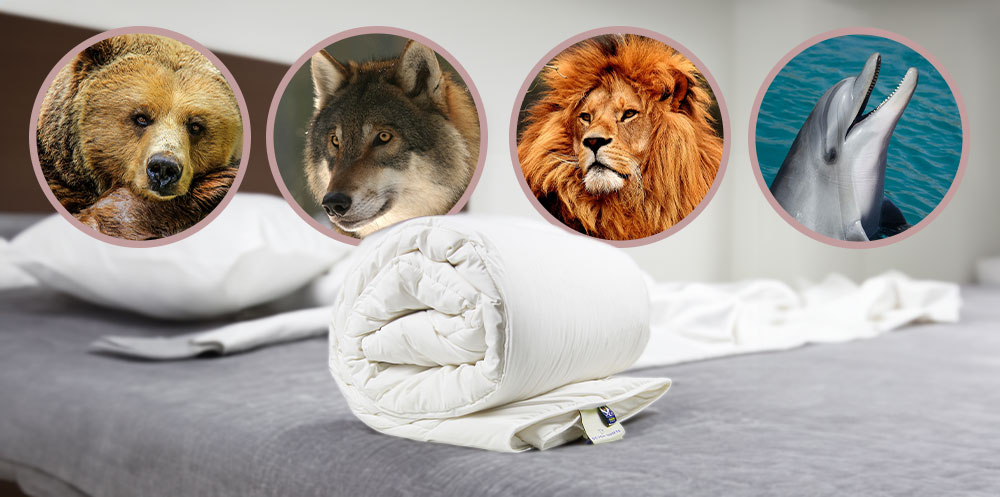What is a sleep chronotype and which one are you?

You may have heard about ‘spirit animals’ – teachers or messengers in the Native American culture. However, you may not have heard about animal chronotypes and how they relate to our energy levels and sleep.
What is a chronotype?
In a nutshell, a chronotype determines the natural inclination of your body to sleep at a certain time. Research carried out by Dr Michael Breus, a clinical psychologist and sleep adviser, looked at chronotypes in relation to energy levels in the day and peak hours of concentration and has identified four different types. Read on to find out which one best matches your natural tendencies with regards to sleep and your hours of peak productivity.
The Bear Chronotype
This is the most common, with over 55% of the population falling into this category. As with real bears, those with the Bear chronotype have a sleep pattern based on the sun rising and setting. Bear chronotype energy levels begin high in the morning and decrease towards the end of the day. If you are a Bear, you like to have around 8 hours sleep a night and can find that not enough sleep will quickly impact on your efficiency during the day. On average, Bears will go to sleep around 11pm, waking at around 7am. They won’t necessarily spring into action straight away in the morning and do like to ‘warm up’ a bit first. If you are a Bear, your peak hours are generally between 10am to 2pm.
The Wolf Chronotype
Wolf chronotypes - about 15% of the population - tend to have their energy peaks in the evenings, when others are slowing down, so won’t always suit a solid 9 to 5 role. However, when there is an opportunity for a Wolf to work during their peak hours of productivity, they will be very effective. If you are a Wolf, waking up early in the morning isn’t the easiest as you will tend to be a deep sleeper and take time to wake up. Wolves will often go to bed at midnight or later and wake up after 7:30am. A Wolf’s peak productivity hours are 5pm to midnight.
The Lion Chronotype
Lions are morning types as their body clock allows them to be early risers and they often have big energy bursts as soon as they wake up. If you are a Lion, your daily schedule is likely to work best when you have meetings first thing, but your energy levels will start to lag if given routine or more tedious early afternoon tasks. Lions often like to have a short nap in the afternoon and, like Bears, prefer about 8 hours of sleep each night. You will usually find Lions tucked up by 10pm and awake at around 6pm. A Lion’s peak hours of productivity are 8am to 12 noon and, like Wolves, they make up about 15% of the population.
The Dolphin Chronotype
This is the rarest chronotype and comprise only about 10% of the population. If you are a Dolphin, you tend to be a light sleeper, easily disturbed by noise and temperature changes, often waking up in the middle of the night. The upside of being a Dolphin is that your peak productivity hours span from around 3pm to 9pm but can start in late morning. Sleep hours are usually from around 11.30pm to 6:30am.
How can I ensure I get the most restful sleep?
Whether you are a Bear, Wolf, Lion or Dolphin, you will want to maximise your hours of sleep, ensuring that you get the essential sleep cycles in order to feel rested and ready for the next day. On-going lack of sleep can cause lack of concentration and fatigue and, if prolonged over a period of time, affect mental health. In addition to establishing a regular bedtime routine and leaving all distractions (such as devices and TVs) out of the bedroom, making sure that you have the right kind of bedding is an important factor in the quality of your sleep. It’s always best to opt for something that is natural and temperature regulating, rather than synthetic bedding that can trap heat when you are already feeling too warm.
Why is wool such a great fibre for soft bedding?
Wool is breathable, moisture wicking and temperature regulating. It helps to keep your core body temperature balanced throughout the night and has been proven to assist in a more restful night’s sleep. It is also naturally resistant to dust mites and the build-up of micro bacteria, so is hypoallergenic and hygienic. At Devon Duvets, we individually handcraft our award-winning 100% British wool duvets right here, in our workshops on the edge of Dartmoor. Natural, sustainable, and chemical free, they are created with a superb drape to make you comfy and cosy – no matter what your chronotype!
For more information about our duvets, as well as our other British wool bedding, please get in touch by telephone on 01726 345399 or send us an email.
Ref: Dr Michael Breus ‘The Power of When’.


